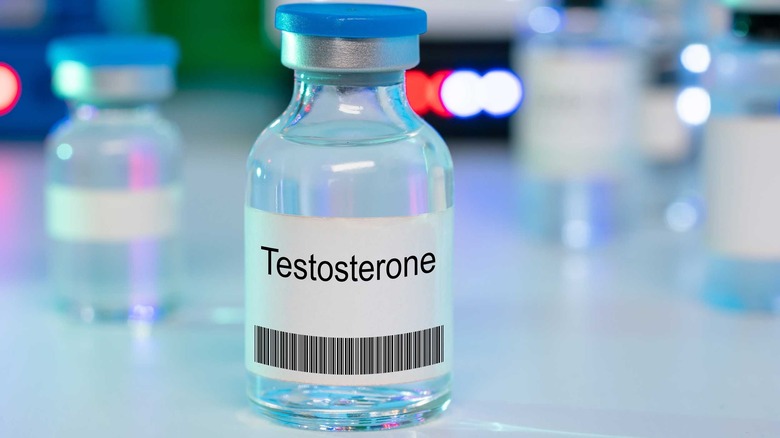What Happens When You Have Elevated Testosterone Levels
You may have heard of estrogen as the female sex hormone and testosterone as the male sex hormone. However, both men and women have testosterone in their bodies, although the bodies of men produce greater amounts. As stated by the Cleveland Clinic, testosterone is the most prominent form of the androgen sex hormone. Androgens are mainly produced in a male's testicles and in a female's ovaries.
During puberty, androgens affect the lengthening of the vocal cords and the deepening of the voice in males. Healthline explains that testosterone and other androgens aid in the production of sperm and red blood cells, promote muscle growth and strength, regulate facial and body hair, and stimulate sex drive. The amount of testosterone in the body also tends to decline as men age, reports the National Institutes of Health.
Women produce smaller amounts of testosterone than men. According to Healthline, normal levels of testosterone in women range from 15 to 70 nanograms per deciliter of blood. Even though women have less testosterone, testosterone plays a very important role in women's health. Androgens like testosterone can be converted to estradiol, which is a form of estrogen that influences a woman's menstrual cycle. Estradiol promotes fertility and pregnancy, in addition to protecting the bones and helping prevent osteoporosis.
Like other hormones, it's important that testosterone levels stay balanced, as too much or too little testosterone can contribute to health problems.
How too much testosterone affects the body
High levels of testosterone in the body can lead to a host of health problems for men and women. Harvard Medical School explains that an excess of naturally occurring testosterone is not common for many men, and most of what researchers know about excessive testosterone levels comes from men who have taken anabolic steroids. Nevertheless, when men have excessive levels of testosterone, they may experience aggressive behavior, irritability, mood swings, lower sperm production, liver disease, and weight gain, among other uncomfortable symptoms. In addition, a man's risk for heart disease, heart attacks, high blood pressure, and high cholesterol can be increased by too much testosterone.
Women can also be adversely affected by too much testosterone production in their bodies. For example, one of the most common hormonal disorders among women is polycystic ovary syndrome (PCOS). As reported by the Mayo Clinic, women with PCOS have abnormal levels of androgens that may contribute to physical symptoms. They may experience severe acne, increased facial and body hair, or male-pattern baldness as a result of excess male sex hormones. According to Harvard Medical School, women with the condition may also notice irregular periods, have fertility problems, and have cysts on their ovaries.
To measure your testosterone levels, your primary doctor may suggest running a blood test. ARUP Laboratories shares that these blood tests are often conducted in the morning because that time of day is when testosterone levels are at their peak.

